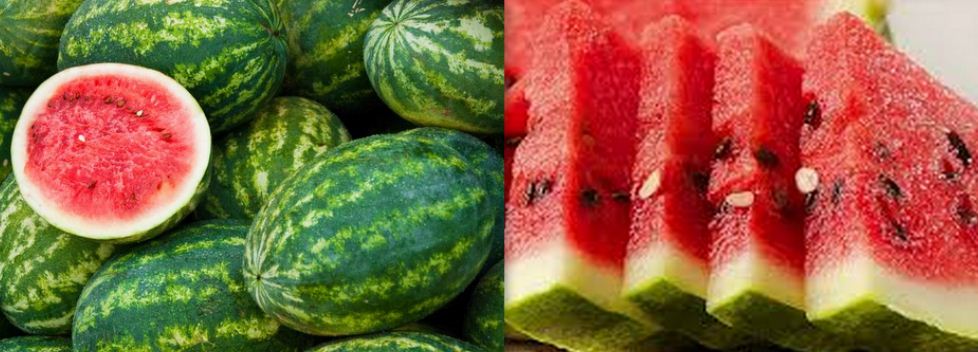About Health Benefits of Watermelon Fruit

Watermelon is the juicy and refreshing fruit we all adore on a hot day. But it is not just a flavorful treat; it packs plenty of nutrients to benefit the body. Watermelon health benefits: Watermelon is a tasty summer fruit we all love to dig into.
Watermelon has real benefits, whether from a refreshing juice or just biting into a slice. Let’s look at the different health benefits you can enjoy. I’ve uncovered reliable information on six that can easily fit into anyone’s lifestyle, no matter where in the world you are. Plus, I’ll share simple ways to enjoy it every day. Let’s see why this fruit is more than just a summer snack!
Why Watermelon Is a Big Deal
Watermelon is grown in warm places worldwide, from Africa to the Americas. It’s a top fruit for its sweet red flesh and refreshing bite. A cup of diced watermelon (about 152 grams) is low in calories but contains many water, vitamins, and minerals.
I based these six benefits on a trustworthy source to keep it simple and practical. Watermelon nutrition has you covered for better digestion and stronger immunity. Let’s break down these benefits and how they work for you.
The Wonderful Health Benefits Of Watermelon.
1. Keeps You Hydrated
Watermelon contains a massive 92% water, making it one of the best foods. The information I got tells me this water content keeps your body hydrated. Staying hydrated is essential for thinking clearly and maintaining healthy organs. When it’s hot outside or after exercise that makes you sweat, watermelon replaces lost fluids quickly. It’s like nature’s water bottle, but tastier!
How It Works
The water inside watermelons keeps your cells happy and your body cool. It has a bit of sugar – about 9 grams per cup – so you get a quick energy lift without falling asleep.
How to Eat Watermelon for Hydration
Eat it fresh by grabbing a slice to cool down after being outside.
Blend it with ice for a chilly drink that beats the heat
2. Helps Digestion
If your stomach ever feels off, watermelon can help. It has about 0.6 grams of fiber per cup, and the source states that this fiber can help the gut move food along easily. Additionally, all these fluids help soften things a little, making you less likely to bloat or feel stuck.
How It Works
Fiber makes your poop bigger while water makes it soft. Together, they make pooping easy. It doesn’t have a ton of fiber, but it has enough to help the gut.
How to Enjoy Watermelon for Digestion
Add diced watermelon to a bowl of oats for a fiber boost
Have it with a glass of water after a heavy meal to soothe your stomach.
3. Boosts Immunity
Want to stay strong against colds? A cup of watermelon contains 14% of your daily vitamin C requirement. This vitamin helps your immune system fight off germs. It also contains Vitamin A (8% of your daily requirement), which prepares your skin and eyes to stand up to anything.
How It Works
Vitamin C helps your white blood cells function better as they can zap away infections. Vitamin A helps your skin as the first defense against bugs or diseases.
How to Eat Watermelon for Immunity
Combine pieces with citrus fruits like oranges for an immunity snack.
Mix it in a smoothie with yogurt for a smooth germ-killing treat.
4. Supports Heart Health
Your heart deserves some care, and watermelon delivers. A cup of watermelon gives you 6% of your daily potassium needs, which controls blood pressure. According to the source, lycopene is a red pigment known to fight heart disease. It works by lowering the levels of bad cholesterol in the body. With heart problems increasing worldwide, taking this fruit will help you stay ahead.
How It Works
Potassium eases your blood vessels, which reduces strain on your heart, and lycopene prevents cholesterol from clogging the heart. Together, they keep your heart pumping strong
How to Enjoy Watermelon for Heart Health
Throw cubes in a salad with spinach and nuts for a heart-friendly lunch.
Make a Mash With a Squeeze of Lemon to Top Grilled Chicken Dish
5. Protects Your Skin
Watermelon can give your skin a little love, too. The source states that per cup, vitamin A and C provide 8% and 14% of your daily needs and work together to keep your skin healthy. Vitamin A and Vitamin C are two essential vitamins in watermelon that work together to boost skin health. They won't help you look younger but will ensure your skin stays nice and firm.
How It Works
Vitamin A mends little rips in your skin, and vitamin C keeps your skin bouncy by holding beauty-building collagen. Plus, the water keeps your skin hydrated from the inside.
How to Use Watermelon for Skin
Eat it fresh with breakfast to nourish your skin daily
Crush it with a fork into a paste and apply it on the face for 10 minutes before rinsing off.
6. Gives You Energy
Feeling tired? Watermelon can perk you up. Eat breakfast fresh and nourish your skin every day. Blend it into a paste and apply it as a 10-minute face mask before rinsing off. The natural sugars (9g per cup) can give you a quick (and healthy!) lift without the candy crash. It’s a light, natural pick-me-up for busy days.
How It Works
Vitamin B6 helps turn carbs and proteins into energy the body can use quickly. The sugar ingredients slightly boost energy, while the water prevents fatigue.
How to Eat Watermelon for Energy
Slice it up for a mid-day snack when you’re dragging
Mix it with a banana for a pre-workout drink like a champ.
What’s Inside Watermelon?
Nutrition in Diced Watermelon: In a serving of diced watermelon of 152 grams, you get-.
Low calorie count of 46 – light and easy!
Water: 92%—keeps you hydrated.
Fiber: 0.6 grams—helps your gut.
Do you have enough juice for your immunity and skin?
Vitamin A is good for your eyes and skin
Vitamin B6: 8% of daily requirement; helps convert food into energy.
You need 6% of potassium to have a healthy heart.
Lycopene: 12.7 mg—fights heart disease.
These statistics are sourced and corroborated by places like the USDA. Watermelon nutrition is simple but powerful, making it a favourite!
How to Add Watermelon to Your Diet Every Day
Watermelons are easy to find in stores or markets worldwide and easy to use. Here is how you can add this fruit to your daily meals wherever you are.
Breakfast Ideas
New Beginning: Chop it and munch on it as it is.
Mix half a cup of berries and milk for a bright beverage.
Add some pieces of oatmeal and a bit of honey.
Lunch Options
Add cubes to warm salad greens with some sour as vinegar.
Salsa Twist: Dice with onion and tomato for a side to fish.
Put chicken between 2 slices and add another chicken juice.
Dinner Suggestions
Stew Side: Toss pieces into a veggie stew for sweetness.
Top your grilled meat with a mixture of watermelon and lime.
Mix chunks into rice with a pinch of salt for a light meal.
Snack Solutions
Use it to make diced watermelon and eat it cold from the fridge.
Try it with apples or grapes for a sweet treat.
"Sip It Slowly: Blend it with ice and cool down."
Setting the Record Straight on Watermelon Health Benefits
They say watermelon can cure cancer and all other problems. Studies suggest that lycopene can be effective against prostate cancer, although humans haven’t been proved helpful yet.
It's the same with asthma or arthritis—it's possible, but not locked in. What’s real? Water helps digestion, immunity, heart health, skin, and energy, but it is not a miracle like nutrients. It's not a diet fix but contains just 46 calories per cup - so pair it smartly with other foods.
Why Watermelon’s Worth It
It’s easy to love watermelon, a juicy, sweet, and healthy fruit. It’s grown worldwide, often cheap, and fits into any meal. Watermelon is packed with nutrients that can provide many health benefits, such as hydration, immunity, heart health, and more.
With these tips on eating watermelon, you can start with just a cup a day and see how you feel. Your body might thank you. Try these watermelon recipes and tell me your story. You can’t go wrong with delicious watermelon!




